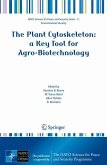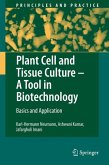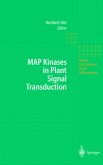The cytoskeleton is a key intracellular structure governing relevant processes such as cell division, growth, molecule trafficking, response to internal and external signals, and others. The ambitious aim of this monograph is to deal with the cytoskeleton as the 'server' for these numerous and multi-tasked nodes. The monograph's content focuses on problems relevant to understanding the structural and functional organisation of the plant cytoskeleton at the single cell and whole plant levels, including the possibility of directly utilizing these functions for practical purposes in agriculture, food safety and health. As a result of advances in plant genomics, cell and molecular biology, special chapters represent new information about genomics, proteomics and bioinformatics of the plant cytoskeleton. In addition to presenting achievements attained in basic research of the plant cytoskeleton, a comprehensive review of applications in biotechnology and agriculture is presented. Special attention is devoted to current achievements in plant biotechnology through manipulating the cytoskeleton structure and functions, and prospects for the development in different professional venues, including industrial/agricultural implementation.
Essential processes in biology such as cell and nuclear division, development, intracellular transport and physiological response, rely on the perception of environmental and intracellular signals and their transduction to subcellular targets. The mechanisms by which these signals are received by cells and transduced towards the proper targets by cytoskeletal components constitute one of the most important and rapidly developing areas in modern plant biology. In addition, fundamentally important responses of plants to biotic and abiotic factors also involve signalling to and through the cytoskeleton, which helps explain the current interest of biotechnology in this field of fundamental research. Manipulation of cytoskeletal components, the microtubules and microfilaments, had, until recently, not been a priority issue for plant biotechnology. However, given the fundamental role of the cytoskeleton during plant growth and development, the potential for biotechnological applications is immense. The NATO Advanced Research Workshop, "The Plant Cytoskeleton: Genomic and Bioinformatic Tools for Biotechnology and Agriculture" was held in Yalta, Ukraine, from September 19 to 23, 2006 - which continued the tradition of the first two International Symposia "Plant Cytoskeleton: Molecular Keys for Biotechnology" (Yalta, Ukraine, 1998) and "The Plant Cytoskeleton: functional diversity and biotechnological implications" (Kiev, Ukraine, 2002).
Essential processes in biology such as cell and nuclear division, development, intracellular transport and physiological response, rely on the perception of environmental and intracellular signals and their transduction to subcellular targets. The mechanisms by which these signals are received by cells and transduced towards the proper targets by cytoskeletal components constitute one of the most important and rapidly developing areas in modern plant biology. In addition, fundamentally important responses of plants to biotic and abiotic factors also involve signalling to and through the cytoskeleton, which helps explain the current interest of biotechnology in this field of fundamental research. Manipulation of cytoskeletal components, the microtubules and microfilaments, had, until recently, not been a priority issue for plant biotechnology. However, given the fundamental role of the cytoskeleton during plant growth and development, the potential for biotechnological applications is immense. The NATO Advanced Research Workshop, "The Plant Cytoskeleton: Genomic and Bioinformatic Tools for Biotechnology and Agriculture" was held in Yalta, Ukraine, from September 19 to 23, 2006 - which continued the tradition of the first two International Symposia "Plant Cytoskeleton: Molecular Keys for Biotechnology" (Yalta, Ukraine, 1998) and "The Plant Cytoskeleton: functional diversity and biotechnological implications" (Kiev, Ukraine, 2002).








